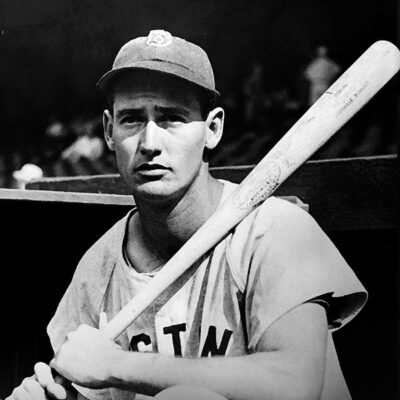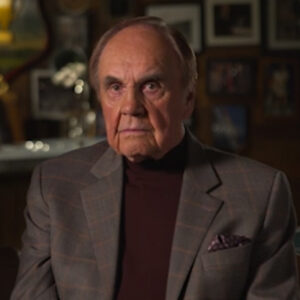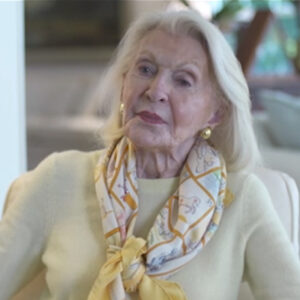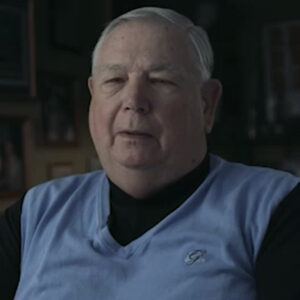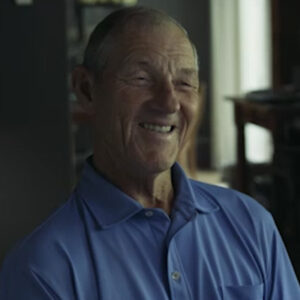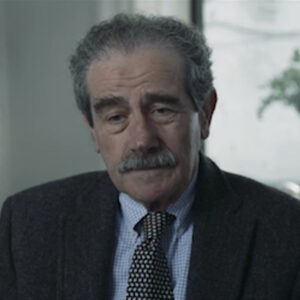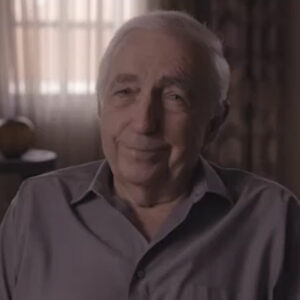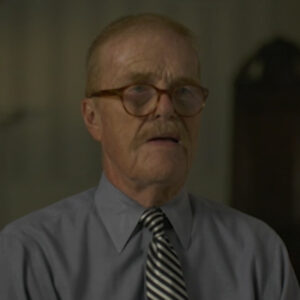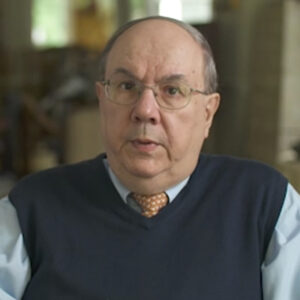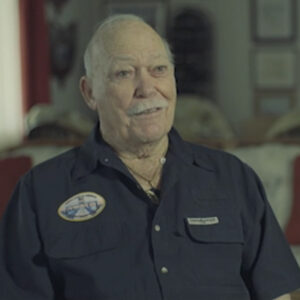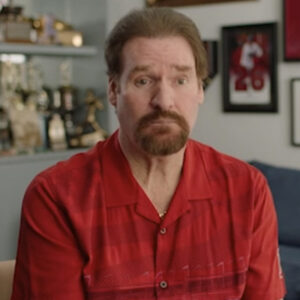Speaker 1 My name is Dick Flavin, FLC, V.I.
Speaker 2 And
Speaker 3 now you knew Ted Williams, didn’t
Speaker 1 you? I did. I was I was fortunate in that when I was a kid and he was playing, I knew him from afar just as a just as a godlike creature. And then I get to know him personally in his later years as he mellowed out and had an appreciation for how fortunate he was
Speaker 2 and
Speaker 1 for the affection in which he was held by people around Boston and in particular. So I had the best of both worlds. I saw him and his great days as a player, which might not have necessarily been his great days as a guy to know, but he was a great guy to know. And in his last years.
Speaker 3 And what was I mean, what was your impression of him when you were a kid and he was playing?
Speaker 1 He was almost a godlike figure. I was giving this some thought the other day. And none of the kids that I knew, including myself, identified with Ted Williams, they’re their favorite players were Bobby Door or Pesci. Mine was Dominic DiMaggio because I wore glasses and all that. But Ted was in a different category. He was something that you didn’t really identify with personally. He was it was almost said he was too good to his personality was. So different than than everyone else is that he was never. We never felt close to him, but but he we everyone understood that he was the best player
Speaker 2 on the
Speaker 1 team and probably in the world, despite what Joe DiMaggio fans might think.
Speaker 3 I mean, what kind of a what what was his personality like? In the early part of his career,
Speaker 1 it was it was so different because he never had a childhood, really, his father was never around. His mother was. Always involved in the Salvation Army and in all, and Ted never really get a chance to have a parent figure in his house. He and his brother used to be left on their own to make supper for themselves and and fend for themselves. And and his brother, Danny, of course, you know, drifted into small time crime and. And Ted, thankfully, got all involved in in baseball and it became his his passion and and his is way out of of that life so that when he get up to the to the Red Sox. He really didn’t have a formed personality, and so that when. People criticize him, he lashed out at them, you know, like like a young kid would do like a like, you know, a really young kid, a two year old, and he had that aspect to him because he had never been trained and nobody ever told him what to do, what was right and what was wrong. And on top of that, he was a volatile person anyhow. And so that it made him almost like a wild animal when he was when he was playing, it was it was almost a danger quality being around him even in his later years. He was he he was like a Bengal tiger, you know, this beautiful animal that was so captivating but dangerous at the same time. And and Ted could always fly off the handle, even in his last years as he as he had at mellowed out and and was less angry than he was when he was playing. If if someone had told me when I was a kid to guess who was going to be the crazy old man and happy old man in his last years, Joe DiMaggio or Ted Williams, I just said Ted Williams, because he was crazy and unhappy. He was playing. And Joe, while he was he had his he had his own issues. He was protected by the New York media. So we never we never saw anything negative about Joe. But as he aged, he became more eccentric and more suspicious of other people. And Ted became more outgoing and more and more giving. It was it was an interesting way in which they live their lives played out.
Speaker 3 Yeah. Because you would think that when had, you know. Reason for living was taken away, yeah, didn’t have baseball, you think you would just fly off completely, but it didn’t work out that way.
Speaker 1 No, because he had many interests, you know, he was a great fisherman, as everyone knows, he was also a great photographer. He was a very, very intelligent guy with a inquisitive mind, a friend of mine who was a executive vice president of the John Hancock Company here in Boston. No big deal, insurance company, financial issues and all that. He found himself sitting in first class on an airplane flight from Florida one day next to Ted Williams. And he said, this is my chance. I get to see Ted Williams and get to ask him all about baseball. Ted started talking to him about what John Hancock did and about business. And the plane landed at Logan Airport. And the guy I never asked had never asked a question about baseball because Ted Wells had gotten so involved in talking about his business. He was a very, very smart guy.
Speaker 3 Yeah. I mean, that was one of the things that struck me reading that book is that the people that he was closest to were just kind of, you know, regular people. His friends were like, you know, like cops and
Speaker 1 cops, you know, in baseball. Bobby Dorje back in those days. And and he loved Bobby because because of Bobby’s family, he’d never had that. And so and so Bobby would take him over to his house when they’d be in in the Los Angeles area. And Ted had never known that growing up. So it was regular people that that he’d like to, you know you know, ushers at the ballpark are cops. And he wasn’t a pretentious guy. He he didn’t seek out the Hollywood stars or the fancy people and all that. He he lived life on his terms. And if you want to go along with him, that was fine. Otherwise, he was going to go his own way.
Speaker 3 What was what was Ted Williams like as a hitter? I mean, people sort of, you know, say he was kind of the classic baseball hitter. Can you describe this is hitting.
Speaker 1 It’s hard to describe if once you saw Ted Williams. Swing. You knew you were never going to forget that swing, there have been other players, which was beautiful swings. No one
Speaker 2 had the.
Speaker 1 The beauty of motion of of Ted’s swing when he came up to the plate, it was really like. It wasn’t everything stopped because it was because there was a there was an excitement and all that, but you just you were just so captivated by him. I’ve never seen anyone. Before or since who? Head to head that. Hold on the crowd that that had
Speaker 2 had
Speaker 1 there’d be stories of of blind people going to the games because they wanted to feel what the crowd felt like. When Ted came up to bat,
Speaker 2 well,
Speaker 1 this isn’t Lee’s book or whatever it was, it was a blind guy who went to the Red Sox games because he could because he could feel when Ted came up to bat. Nobody had to tell him that Ted was coming up. The crowd told him.
Speaker 3 How did how did you get to know, Ted, when
Speaker 1 I got to know Ted Williams through Dominic DiMaggio when I was a kid in the third grade, I had to wear glasses. This is in the 1940s, 1946. The only position player in the American League at that time wearing glasses was Dominic DiMaggio. And so he became my hero. He was a Red Sox guy and and all that. And and he was pretty good. You know, the starting outfield in the American League All-Star Games was every year. Of course, Ted Williams and of course, Joe DiMaggio. And more often than not, the third starting outfielder was Dominic DiMaggio. He was a terrific player, a better defensive player than Joe, and always underrated. You know, when you’re playing next to Joe Torre, Ted, and you’re Joe’s little brother, you know, you’re going to be you know, you’re going to be an afterthought. And and I think that’s one of the reasons that that Dominic is in the hall is not in the Hall of Fame. He’s he holds defensive records to this day. That is still that is still in the works. So I got to know Tom later on in life and. He brought me into his circle and. And I get to know Ted that way and. One thing led to another and and and we became not close, but I know him well, I know him well, and I go down to Florida and visit him and.
Speaker 3 And what was he like in the years that you knew?
Speaker 2 He had a great heart, he had a
Speaker 1 great heart,
Speaker 2 he helped
Speaker 1 out a lot of people. He was. He was so interesting to be around, is such an interesting character and at ease with himself, at ease with himself all the time. Ready to give you opinions on all kinds of people thought Ty Cobb was full of prunes because Ty Cobb’s theory on hitting was you just hit the ball, just slap the ball and someplace and get out. You know, Ted, Ted wanted to drive the ball, want to get distance. And you see all these things about. The players nowadays, you know how important it is to get the ball in the air. There’s nothing new about that as far as head winds is concerned. Ted Williams had figured that out and he has all figured out mathematically. And in those days, if you read the science of hitting by Ted Williams, there’s nothing new to what these guys are doing today. That’s how Ted approaches hitting 70 years ago.
Speaker 3 I mean. You know, I think I read that he hated if someone called him like a natural because he made such a science of hitting it, was that
Speaker 1 that’s that’s true. You know, it’s one of those things. Sorry, he had natural ability
Speaker 3 because my questions are cut out. Yeah, I mean, kind of like this.
Speaker 1 Yeah, my question. Ted had natural ability. But that was only a part of it. I mean, he worked at it and refined the natural talent, he had an approach that really scientifically as he became better and better through the years, you see a lot of players come up to the big leagues now, and they’re great at the beginning because they had this wonderful talent. Someone said to me once, the difference between the major leagues in the minor leagues, the minor leagues, they figure out what you can do in the major leagues. They figure out what you can’t do. And so you see a lot of guys come up in big deals at the beginning of their career and they kind of fade away or fade into the darkness. Not Ted. Ted became better all the time. He he broke his elbow in the 1950 All-Star Game and said that he was never quite the the same hitter, but he started going to the field more often and. You know, they they never caught up with them on that, they didn’t realize that that he wasn’t pulling the ball quite as much as he did earlier in his career. But, you know, I think that, you know, so many people, you know, if you have a natural talent, if you have natural talent as an accountant, if you’re going to be a CPA, you’re going to you know, it’s more than just your natural talent. You have to do that work. Great actors the same way. And great, great hitters, great athletes. You know, you talk to these I think of someone back in my day like like Bill Russell. He had great talent, but but he built upon that talent. And Ted Williams was the was the same way he he built upon his his natural abilities. Everyone said, oh, well, he sees the ball better than anyone else. He did see the ball better than most people. But that doesn’t account for the four for what he was able to accomplish throughout so many years.
Speaker 3 Yeah, I think I think, you know, he said that. He always liked to face pictures that he had history with, that he had seen in the past. And so, I mean, did he really study the way different pitchers pitch in that, you know, the choices they made? I mean, nowadays people watch videotape and all that stuff. But I mean, did he did he do that? Was he kind of ahead of his time?
Speaker 1 And he was way ahead of his time on that. Dom DiMaggio and Johnny Pesky used to say that. When they were batting in front of Ted, when they’d come back to the dugout after being at bat, Ted would cause them and you know, what’s he got? What’s he throwing it all? What did you get? What would you hit? And, you know, half the time they were disgusted with themselves because they grounded our son and they would say,
Speaker 2 I
Speaker 1 don’t know for crying out loud. And, of course, Ted would erupt in a volume of. Swearwords do whatever the best way of saying it was that they weren’t approaching it quite as clinically as he did,
Speaker 3 I think I read somewhere that he actually would talk to the umpires when they came into town trying to get information from the
Speaker 1 he’d bring the umpires autographs and everything and he’d go to the umpires room before before a series of umpires would come in at the same time that the visiting team would come in. And anything you guys need or I give you some bats and balls. And when you. When you have that kind of a charismatic figure
Speaker 2 paying
Speaker 1 attention to you, it’s pretty hard to resist, it’s pretty hard to resist. And Ted knew he had that way about them. I have a great picture on my on my cell phone, which I’ll show you later on. Frank Sinatra in 1980 came to Boston to sing at
Speaker 2 a
Speaker 1 tribute for Tony Conigliaro, the great Red Sox player who was being in 1967 and had a
Speaker 2 had a
Speaker 1 bad death some years later. And the reason that Sinatra came was. He knew that Ted Williams was going to be there and he had never met Ted Williams, Sinatra was a baseball guy, grew up in Hoboken, big Yankees fan, and of course, he became a L.A. Dodgers guy and all that. A friend of mine was a of. Photographer in town, and he was the only photographer in the green room, Tedi’s in the green room they bring Sinatra in and. They introduce Sinatra to Ted Williams to alpha males in the same room, only one of them is going to come out as the as the alpha male. I’ll show you the picture later on. You never saw Sinatra with the expression like that on his face. Look, as a third grader, he said, oh, my God, he’s an. I was in the presence of a great Ted Williams, the great, great picture.
Speaker 3 I just want to talk a little bit about. Ted’s relationship with the Boston media, I mean, was it what was different about playing baseball in Boston? And why do we have such a conflict with the press?
Speaker 1 I don’t think it was so much the Boston media being different. Ted Williams was different and Ted Williams when he was criticized. Took it very personally and.
Speaker 2 And fought back
Speaker 1 and lashed out at the media, Soledad. And then the media would kind of lash out at it, Ted, and it escalated and kept on escalating over the years. He he was the person who, because of his volatility, because of his. His. Untamed wildness as a person, he couldn’t help himself. And so it kept it kept escalating and. You know, there’ll be some guys in the media who jumped on that, that’s that’s their ticket, you know, you give Ted a little tickle and then you’re going you’re going to have something negative to to write about. And Ted rose to the bait every time others individually became very close to Ted. But as part of the pack, they they were the enemy as far as he was concerned. And he used that, I’m convinced. As a motivational
Speaker 2 tool
Speaker 1 that they were against him when he was going to show them and and he got angry
Speaker 2 and and
Speaker 1 oftentimes when things were going. Just going along with Ted, he would kind of manufacture some kind of new incident or something, and then that would give them I would give them something to to propel himself to to show those dirty so-and-so is what it was all about.
Speaker 3 And he thought he sort of thrived on the drama.
Speaker 1 Oh, I think he did. I think he did thrive on the drama because there was such drama
Speaker 2 about him that.
Speaker 1 You either had to. It was it was easy going to swallow you up, are you going to or you are going to swallow it up? It’s like Donald Trump, you know, he I supposed to tell it to of it. He’d have been talking about fake news all those all those years ago. But it was. You know, in those days, it was. Just just the drama
Speaker 2 of
Speaker 1 the whole thing, it was like a soap opera, it went on for years and years. When I first started following the Red Sox the first year, I really followed them as a as a team was 46. My father had taken me to Fenway Park in 1945. So from 46 on, I was into them. And and so I missed Ted’s first years. But I saw the last 14, 15 years. And it was it was compelling. It was compelling just just to watch him. You know, he’d give the French salute to the crowd and he spit the press box and spit towards the stands. It was it was crazy. It was crazy. And he thrived on it. He’s thrived on.
Speaker 3 And it didn’t I mean, you think, you know, as his career went on, he would have found a way of sort of accommodating in the end, the people of Boston and the press would have found a way to becoming him, but it almost got worse, like in his last years. It was it was toxic, really?
Speaker 2 Oh, yeah.
Speaker 1 Yeah, it was. I really, really think
Speaker 2 that
Speaker 1 he realized that when he got angry, he could be better
Speaker 2 and
Speaker 1 and so he brought I think he brought a lot of it on deliberately,
Speaker 2 particularly
Speaker 1 towards the end of his career when people really, really wanted to love him.
Speaker 2 I mean,
Speaker 1 you know, in his last years, everyone realized that this guy is probably the greatest hitter who ever lived. In addition to being one of the most compelling personalities who ever lived
Speaker 2 and and and
Speaker 1 people became started to realize how good he was to the Jimmy Fund and what and what a what a great hardyhead as a person. But then he would he would suddenly lash out and it was people that didn’t know what to think. And and that’s when after Ted finished playing and as he aged and became more appreciative of that, these people really liked him. That’s when they really came to him. Nobody really
Speaker 2 loved
Speaker 1 Ted as a player. They admired them. They they were fascinated by him. But the real love for Ted Williams came later in his life and he started to return that.
Speaker 3 Yeah. I mean, that makes me think. You know, when he came back for the nineteen ninety nine all star game, I mean, it was sort of like he was embracing. The crowd in a way that you never had as a player, were you at that at that?
Speaker 1 You know, it was it was one of the biggest mistakes I ever made in my life. I didn’t go to that game. That was when the All-Star Game itself was really in the nature of its existence. And I said, you know. The league is the leagues are such that you hardly know some of these players who are all stars
Speaker 2 now,
Speaker 1 the starting team is going to be out of there out of the third inning. And and nobody gives a damn about the All-Star Game one way or another. I’m not going to go I’m not going to bother going to the All-Star Game. I’ll watch it on television. One when Ted came out in the golf cart, as I said immediately, and myself sitting at home alone watching it on television. Boy, what a mistake I made. What a mistake I made.
Speaker 3 But describe that scene in 1999. He came out you.
Speaker 1 He came out because the crowd erupted in a in a roar. He had he had had a couple of strokes by that time and had to be ferreted in a ferid in a in a golf cart. And and they brought him out to the pitcher’s mound with all the other was all the all stars and all the old timers on the field and. They just converged on, they wanted they wanted to be around him. Every time I ever saw him come into a room with all ballplayer’s. The old ball players always stood up when Ted came into the room, it was it was amazing. And the same thing was true
Speaker 2 of
Speaker 1 of that all star game, how these guys all want to get close enough to touch him to to see him close up. He was a godlike figure even when he was so diminished physically at
Speaker 2 that point,
Speaker 1 he had had two strokes. He couldn’t get around on his own. He he could only see you if you look if he was looking directly at you, he had no peripheral vision at all. And there was still something about him that was so compelling, so compelling and and that that was a natural thing that you can’t buy that.
Speaker 2 And he had that aspect to him.
Speaker 1 Certainly in the 1940s, when when I first became aware of him and first started following the Red Sox, but I think even before that, even as a kid in San Diego, he had that something special that. I guess Baber’s had
Speaker 2 it
Speaker 1 and other players have had it, so not to the extent that Ted Williams and Babe Ruth did, and that’s why Ted Williams and Babe Ruth are still the most talked about players in the history of the game. Joe DiMaggio was considered back in the day. Well, it’s an all around player. Maybe you’d say that Joe is a better player. But as the years have gone by, Joe isn’t talked about near as much as Ted is kind of on everyone’s mind. And as other players have faded from the scene,
Speaker 2 only
Speaker 1 Babe Ruth and Ted Williams stay. At the forefront of it.
Speaker 3 You mentioned Joe DiMaggio, you know that that magical season of nineteen forty one. With the two of them, we’re just kind of at the forefront of everyone’s attention. Talk about that, the relationship of the two of them that season and how, you know, you kind of the attention kind of went back and forth. And of course, that was the year that DiMaggio had his hitting streak in the year that Williams hit for
Speaker 1 nineteen forty one was was a wonderful year to be a baseball fan. It’s before my
Speaker 2 time, but.
Speaker 1 Ted Williams and Joe DiMaggio, two fascinating players, both went on these tears that had never been equaled since at the time. If you read about it. DiMaggio’s was the more dramatic because Ted was up around 400 all the time and no one really thought he was going to end up
Speaker 2 at 400, but
Speaker 1 Joe’s Street came in the middle of the year
Speaker 2 and.
Speaker 1 A kid playing next to Joe’s brother was would get from the scoreboard operator how Joe was doing, because the scoreboard operator would have a radio in the in the back of the left field wall. And so the scoreboard operator would let Ted know if Joe got a hit, if he still had the streak going, and Ted would then call over to Dominic and let him know that Joe got another one. That’s it’s up to 55 games or whatever and. But but from that point on, and then at the end of the year, of course, it became all altered because because of the
Speaker 2 four
Speaker 1 hundred and Ted Williams and Joe DiMaggio then became. Locked together forever. Years and years went by and they were all thought of in the in the in the same
Speaker 2 breath, and
Speaker 1 when Joe became ill in the late 90s and and was apparent that he was that he was dying, Ted used to call Tom every single day. To let them know how how Joe was doing, not to Ted and Joe were close at all, every time they’d be in the same field together, photographers would run up and, you know, get them to pose together. They had no relationship. They had no relationship. But Ted knew that when Joe DiMaggio was dying, part of Ted was dying, too, because that whole age was was was going
Speaker 2 by and
Speaker 1 he and Dom had long since become very, very close and tormented, a much closer to Ted than he did to Joe. And he and Joe were very, very close when they were young. They’d grown up in the same bedroom. But as Joe became more eccentric and more suspicious of people, their relationship kind of it never went sour, never went away, but became more perfunctory. And Ted and and Dom became closer and closer. And then it really, really became close. When when when Joe was dying.
Speaker 3 I mean, how would the two of Ted Williams and Joe DiMaggio? How are they similar and how are they different? Here these two guys from California pretty close to same age and they’ve been kind of, as you said, locked together in history. Yeah. You know. In what way do they same language, what were they different?
Speaker 1 Well, they were similar and and they were both great ball players. And I really think that’s about the only way they were similar, Joe came from a family of nine children, a close knit family. Ted had had just his brother and, you know, his mother and father weren’t around.
Speaker 2 Joe.
Speaker 1 As he became more suspicious, more eccentric. I want to say to David Halberstam, when he was writing the teammates, I said, what’s he said? What’s the difference between Ted and Joe? And I said they both realized that Dominic DiMaggio was the more complete person than they were needed today. Joe, had
Speaker 2 they were
Speaker 1 capable, I think, of having a happy, fulfilling relationship with a woman needs neither of them were were family men. Both. Existed on their baseball reputations, and they both understood that Dom was happily married, that he had wonderful kids and grandkids, and that he had started a business independent of baseball, made more money after baseball than he ever did when he was playing. And the difference is that Ted Williams honored Dom DiMaggio for what he had accomplished in life and Joe DiMaggio resented him for. Uh. It was it was very Joe did not want people to get too close to him. And Ted was the opposite when they both came back to town in 1991 for the fiftieth anniversary of the nineteen forty one season. They had an event at Fenway Park in which they were all players from both of their careers. The Red Sox had Johnny Pesky and Bobby Door and Dom DiMaggio. The Yankees had Phil Rosillo and Tommy Hendrick and all those players. And Ted couldn’t wait to see all of his old teammates. Joe didn’t want to see him and in fact, did not see him. Joe did what he was asked to do and came on the field and all that and then took off without without even bothering to see his old teammates.
Speaker 3 Of course, another thing that happened in that 1941 season was that the dramatic all star game, you know, Ted Williams, it’s been kind of. Critiqued for not getting the big clutch. Yeah, that certainly was not the case, that all star game when. Right. You can you just talk about that moment, are you.
Speaker 1 Well, when when he hit that home run in in nineteen forty one. It meant an awful lot to
Speaker 2 them if
Speaker 1 you if you look at the old film footage of that, of him kind of romping around around the bases. You knew that it meant a whole lot to him and it meant a whole lot to him later in life and throughout his life, there is a gate in front of his house
Speaker 2 in
Speaker 1 in Florida, in Hernando, Florida.
Speaker 2 And the the
Speaker 1 password and the gate was 1940. One star, you hit the star. So so that meant a whole a whole lot to him. As did although he always played it down the last home run he ever hit.
Speaker 3 Yeah, I want to talk about that, I just want to ask one more thing about nineteen forty one. How hard is it to hit four or six over the course of the baseball season?
Speaker 1 Hitting 406 is pretty damn tough. As is evidenced by the fact that it has been done for 75 years. It’s and the fact is that in today’s rules, Ted would have hit higher than that. Nineteen forty one is a 15 year period from the late 30s to the early 50s when the sacrifice fly rule was not in effect. If you hit a long fly that drove in a run, you were charged with an at bat, someone I saw somewhere figured out that if if there had been a sacrifice slide rule in effect. That year, that would have hit for 12. And it very well could have been and certainly would have been more than four or six. So there is there is that aspect, but you have to you had to be very fortunate, you know, in order to hit
Speaker 2 400
Speaker 1 and you’ve got to be good. You’ve got to be good and. I don’t think it’s ever going to happen again. I don’t think it’s ever going to happen again.
Speaker 3 Why do you think it’s.
Speaker 1 Because he did travel the night baseball as a business, baseball has become so different and back in those days, players didn’t use Slider’s pitchers and use sliders. You know, they used the traditional curve ball and fastball and and changeup. But the slider is a hybrid pitch,
Speaker 2 and
Speaker 1 it wasn’t used back then.
Speaker 3 Talk about the last day of the 1941 season, I mean, Ted average going into that last day was was mathematically was about four hundred he could have sent out and not played.
Speaker 1 Yeah. Joe Cronan Joe Cronan was a manager in nineteen forty one and he gave Ted the option of not sitting out a final double header against the Philadelphia Athletics and. Ted didn’t want didn’t want to take that that route. He he wanted to play one because he liked to play, and two, because if he was going to hit 400, he was going to hit 400. And if he wasn’t, he wasn’t, that was going to be it. You got to remember, he was a kid back then. He was just a kid. He was 1941. He was 22. And at the end of it, he turned twenty three in on August 30th. So he didn’t think this was going to be the end of the line or the be all and end all of his his career that that he’s become so known for. But then he went six four eight six four eight with
Speaker 2 that kind of pressure
Speaker 1 on you is is phenomenal.
Speaker 3 Talk you a little bit about. Ted’s service in the military, of course, first in World War two and then during the Korean War. What was his attitude towards that? I mean, did he feel. You know, embittered in some way, or was he proud of that service and.
Speaker 1 Well, Ted was certainly proud of of his service in the military, but there was it was. Mixed feeling at first, you know, he claimed his mother as a dependent and and the media got on him for that, although his mother was dependent on
Speaker 2 him
Speaker 1 and he ended up going into the into the service anyhow and enjoyed his time in the service because he learned to fly. And that was a great that was a great thing. He was an inquisitive person. He was resentful when he was. Called back and. And 52
Speaker 2 and.
Speaker 1 But he went.
Speaker 2 And, you
Speaker 1 know, John Glenn became very, very close when he was John Glenn’s wingman in career and and, of course, famously survived his plane being hit and managed to bring it back to base and barely got out of it before the plane exploded on him. But. As the years went by, he was more proud than ever that that he had done that he was he was a person who respected authority. So if he was going to be drafted, he was going to he was going to go. And he was going to do as he was
Speaker 2 told,
Speaker 1 and every manager he ever had, you never had a problem with a manager, never an ego problem with the manager, or he did, as he was told. Now, managers understood that. That he was a different kind of person and, you know, they weren’t going to ask him to bunt or anything like that if a manager had asked Ted Williams to lay down. But he’d have laid down about.
Speaker 3 Any extra respected umpires?
Speaker 1 Two respected umpires and courted them. He was very, very nice to umpires. He would go to the umpires room before a series and. Ask them what they need. They need the autographs, you need the baseball bats or anything. Never showed up. An umpire never argued with an umpire. There’s a famous story that some rookie catcher was behind the plate when Ted was hitting and pitchers threw a ball. I was close to the strike zone, but the umpire called it a ball. And the catcher started yapping at the at the umpire. An umpire said the catcher. When the ball is a strike, Mr. Williams will let you know that the ball is a strike.
Speaker 3 Uh. Getting back to his service. I mean, if you look at his career numbers, losing those five years, I mean, he could have he could have had over seven million seven hundred a month. I mean, he really did rob him of. You know, some of his. Potential is being, you know, rivaling Babe Ruth and.
Speaker 1 It robbed him of being in the service for those years, robbed him of of having huge numbers comparable to Tyrus. And he understood that. But it also added to his legend that says he had served twice, not once, but twice. The only other major league player who did that, I believe, was Jerry Coleman. And so there was that aspect to him that he that he was a war hero in addition to being a great player and it added to the legend. Whether he would have gotten up to 714 home runs, which is Roo’s total or not, I don’t know. He certainly would have been way, way over 600. His his on base percentage would have been way higher than it is now, and it is now, it’s for age three. No one is close to that anywhere near close to that. The second highest is Ruth and slugging percentage. This is first and second of all time is Ted Williams. The certainly the greatest to baseball players that ever lived and the greatest hitters who ever lived.
Speaker 2 But Ted has that.
Speaker 1 That additional same thing of being being a war hero to.
Speaker 3 I mean, what does it mean for his legacy that the Red Sox never won a World Series in his tenure? I mean, was he was he a winner? Did he care about winning or was it more kind of a, you know, kind of a personal thing for him?
Speaker 1 I think he cared about winning more than some of his enemies, that the media said that he was all about Ted Williams and that was that there are stories about him at the end of the nineteen forty six World Series about him weeping openly, openly in the. In the clubhouse, I think I think winning mattered. Mattered to him an awful lot in his last years, the the team was no good, they had broken up the team, you know, terrible mistake. Rather than building on the veterans and letting them go, as long as they get older, they. They sold all the veterans out from under him when Ted went off to Korea in 1952, they were still a contending team. He came back and they had nothing left. In that short period of time. And that’s from the Red Sox went into their real decline that did not did not come out of it until 1967.
Speaker 3 Do you know that the story of when he came back from Korea and. He took batting practice on the field. The owner was sort of encouraging him to go down and take some swings he didn’t want to, and then he went down. And he just was hitting home run after home run. You remember that story?
Speaker 1 I don’t remember that specific story, but he was. He he just
Speaker 2 did
Speaker 1 so many great things like that, you know, when he came back at the end of the fifty three season,
Speaker 2 he
Speaker 1 hit over four hundred and in that short
Speaker 2 time, he
Speaker 1 picked right up where he had left off. Maybe his greatest season was 57 when he when he hit three eighty eight. He certainly would have been over 400 if if he was a younger man, you lay out a few hits in the in the in the course of the season at. Just nobody like them. It’s just nobody like them.
Speaker 3 You mentioned that the 1957 season and how. Remarkable is that. I think he had to batten batting titles when he was in his late 30s, I guess, or. And how how difficult is that for someone
Speaker 1 that stays in his his accomplishments late in his career where were unbelievable in 1954, he was denied. The batting title, because he had not had enough official at bats, he was 14 official at bats away and he would have won, but he led the league in walks. They now they changed the rules. They got it. Now it’s plate appearances, not official batting appearances. So in reality, he had come up to the plate and I think he had one hundred and thirty four walks that year or something like that. But they said he didn’t have enough. Enough at bats was crazy. He had still another batting title.
Speaker 3 And what does it say about Ted Williams that he and I think in his final season, he actually took a pretty large pay cut to go out and play?
Speaker 1 Yeah, he did. And I and I think the pay cut was. Was his doing. He he did not want to go out on the note of the 1959 season or hit, I think, to 54, and he had the pinched nerve in his in his neck that whole that whole year. And you could tell I remember watching on television back in those days, he he didn’t have the same swing. He didn’t have the same swing. And and everyone thought he was done and including Tom Yoky and. But Ted, Ted one is a jockey. He wanted to have that that last year and and he did and he his skills were starting to diminish a little anyhow. He still. Was so great, I think he hit three 18 that year, which is well below his his norm.
Speaker 3 I want to talk about the the final at bat, and I also want to get you to read your column. We have a copy of your your book.
Speaker 1 Oh, which poem you want me to do? I want about.
Speaker 3 Is blasted back.
Speaker 2 Oh, yeah, I got it. I know that.
Speaker 3 But. You set that scene for me that day in Fenway Park. What was it like when he came up to that the last time?
Speaker 1 When Ted came up for us,
Speaker 3 this is his house in the arm. Yeah, yeah.
Speaker 1 And I will cross my arms and.
Speaker 2 We have to get our.
Speaker 1 Ted’s last game. We weren’t really aware. That it was said the last game we were aware it was his last home game, but the Red Sox was scheduled to go to New York for the final series of the season, and Ted had made up his mind without telling anyone other than Curt Gowdy that he wasn’t going to go to New York. He wanted to finish up but at Fenway Park. So we didn’t realize quite how dramatic it was. Gowdy was the only one who who realized how dramatic it was. It was a cold, raw day at the end of September. Wind blowing in. Ted hit a long
Speaker 2 fly in
Speaker 1 the middle of the game, fell short and everyone thought, well, that’s it. And then he came up in the in the eighth inning and. People realized there were only ten thousand five hundred and fifty four people in the crowd. And. People realized they were suddenly seeing Ted Williams for the last
Speaker 2 time
Speaker 1 as a player and. Fisher, the the pitcher threw a fastball that he thought could bite, said he thought that was was laid on it and he might have been late on it, but. But that led to believe that she’s going to throw another one and. And he did the and he hit how he hit it out of the ballpark, I don’t know, into that wind and all that into the deepest part of the ballpark, into that corner of the Red Sox bullpen, which is right by the triangle, certainly more than 400 feet and. You know, as John Updike wrote in his book, it was it was it was an unbelievable. Moment as as Ted crossed the cross the plate for the last time and they thought they were seeing him for the last time, and then of course, the manager sent them out onto the field for for the next half inning in that senator’s replacement. So that people would have a chance to see Ted for the for the last time we had he had a great flair for the dramatic and he couldn’t have had it. He couldn’t have had a better exit line.
Speaker 3 But he I mean, he didn’t doff his hat, he didn’t acknowledge the crowd. Why do you think he is stubborn?
Speaker 1 He was Ted was a stubborn guy, he said when he was mad at the fans years before, he had said, I’m never going to tip my hat to these bastards again. And by God, he wasn’t going to do it. And on that last trip around the bases, he thought about it, but he said, you know, I’m not going to do it. And he didn’t do it until, you know, years later when they retired, his number up on the and the right field facade, that’s when he he had mellowed out by that point. And so he took
Speaker 2 a ball
Speaker 1 of ball. Players cap with him, Jeffrey Gordon’s cap stuck in his back pocket. And and when he was introduced to the crowd,
Speaker 2 he
Speaker 1 said that he’d never tipped his cap and he pulled a cap out of his back pocket and put it on his head and then pulled it off and waved it around that he tip his hat to the fans of New England’s the Red Sox fans. And it was it was a great, great moment. They were both great moments, but there was nothing like that, that last homerun.
Speaker 3 Yeah, I think I actually saw the interview where they asked him why he didn’t, you said, yeah, I thought about it for a minute, but I just couldn’t do it. Yeah, yeah, yeah. Let’s see. Well, just when we’re in that moment, I want you to look at a picture, let me show that photograph and a lot of people have made a lot of this photo. And I want you to just get your impression of this. This is the photograph of him right after he hit the last homerun. Yeah. And so maybe. Take a look at that and then I’ll ask you to. To what do you see when you see that photograph?
Speaker 1 I see Ted Williams revealing himself. He had that you know, he closed his eyes for a little bit. And you can see him saying to himself, by God, I did it by God, I did it. You see other pictures of Ted Williams swinging and that classic follow through. You never see that expression on his face. He’s got his eyes on the ball. He’s watching the ball go out. This time his eyes were closed and he kind of looked off. It was kind of off in the distance as he as he turned his face, I think he said, by God, I did it my last time up.
Speaker 3 So it was sort of a personal moment.
Speaker 1 I think he revealed himself. I really do. I really do.
Speaker 3 I just want to a couple other suburbs and I want to read now that home. Just very quickly, he was married three times all of his relationships ended in divorce and or failed marriages. What was his relationship like with women and why did he struggle in those marriages?
Speaker 1 He was a person who lived by his own rules, and that made it tough.
Speaker 2 For women.
Speaker 1 Marriage is you know, there’s a lot of compromising done in marriage, Ted wasn’t a compromiser. He also had this volatile side to them where they would be. Almost uncontrollable. Moments of
Speaker 2 rage
Speaker 1 must have been very difficult for every woman and for the three days he was married to. There was. There was a woman named Louise Kaufman, who was the only woman who ever came close to taming him, and she had. Known Ted early in his career and was just crazy about him, and as Ted went off and had affairs with other women, married other women, Louise was always there in the background waiting for him. She wasn’t a beautiful woman. All of Ted’s wives were beautiful. And other women that he was involved with were beautiful. But Louise was always there and Ted was in his 60s when he kind of realized. That Louise. Is is the woman that’s best for me
Speaker 2 and
Speaker 1 she could calm down his his rages when he went in the room, she knew what was good for him and what wasn’t. And she came the closest that anyone ever did to taming him.
Speaker 2 And he lived.
Speaker 1 In a very contented way in his last years. With the and and and when she died, he was. Heartbroken might not be the word, but but he was kind of lost. Dom DiMaggio was was one of the only ones who realized what she had meant to Ted because he had he had he had become domesticated. He had a dargin
Speaker 2 in
Speaker 1 all. He’d never had that kind of thing going on in his life before. And it tamed him down and calmed him down an awful lot and really, I think, led to his becoming a more fulfilled person later in his life.
Speaker 3 Just ahead, we’re talking about relationship. What would what was I mean, we touched on his his youthful upbringing, what was his relation to his mother and his father like?
Speaker 1 Well, I don’t think you have much of a relationship at all with this was his father who was kind of in and out of his life. He’d be missing for weeks at a time. His mother. Was a strange a strange woman because she was off, you know, taking care of Mexican children across the border and in Mexico and and wasn’t paying any attention to her or her own sons. So it was it was it was very interesting because she was half Mexican and. Ted hid the fact when he was playing, hid the fact that he does he had this Mexican blood and. You know, politically, he was to you talk politics to Ted Williams. He was to the right of Attila the Hun except on. Civil rights issues, because he had seen fit, he had cousins who didn’t have an Americanized name like like he did, and he saw how Mexicans were treated in San Diego, the way blacks were in the in the normal south. And it’s it’s why he had. He had an enlightened view is a wonderful story that Catfish Hunter told me in 1960, Ted’s last year. The Red Sox and the Cleveland Indians both trained in Scottsdale, Arizona, and at the end of spring training, they were going to take off. Both on the same plane and go to New Orleans to play an exhibition game before heading north and starting the season, well, they get to New Orleans. There are two buses and one taxicab. Waiting for them. One bus for the Red Sox won best for the Indians and a taxicab for the two Red Sox players and the two Cleveland players who were black for the Red Sox. It was Pepsi Green and Earl Wilson. For the Indians, it was. Catfish Hunter and Mudcat Grant and Feek Power, whose slick fielding first baseman so. New Orleans, 1960s, a segregated city, the cabbies to take the black guys to the black hotel and the and the two buses are going to take to the Red Sox and the Indians, the rest of them to to the white hotel. The cab gets to the black hotel. They realize the luggage has been thrown in with the white guys. Luggage is at the white hotel. They deputise Mudcat Grant to go get the luggage. Mudcat takes the cab to the white hotel. He comes up to the hotel. He’s walking in the door. He can see the luggage by the concierge desk and he’s walking into the hotel. And the bell captain comes running and he says, Where are you going? He says, I’m just going in to get our luggage, you know? You know, he said, no. And weird guy is is going to. Walk into this hotel as long as I’m in charge, and and he said, yeah, but they are going to get the luggage. Is it too bad? Too bad. Forget about the luggage. You’re not you’re not walking in here. Just then Ted Williams comes around the corner. Ted like to take a walk when he get when he got into town and he knew Mudcat Grant because they had shared the same training facilities and in Arizona. So he says, hi, Mudcat, how I might catch it? Well, I get this problem. I got the luggage here. It’s right in there. And this guy won’t let me pick up the luggage. And Ted said, well, you shouldn’t pick up the luggage. He should pick up the luggage, he turned to the captain and he said, you pick up Mr Grant’s luggage and put it in the cab for him and it was Ted Williams. And when Ted Williams was, you know, would give an order. You knew it was an order. And the poor, bigoted Bell captain ended up getting the luggage and putting it into into the cab. That’s how enlightened Ted was on that on that issue. And, of course, it all came to the fore in his introduction is introductory speech at
Speaker 2 the at
Speaker 1 the Hall of Fame when when he called on baseball to allow people from the old Negro Leagues into the into the hall. And because it was Ted Williams who said that’s what they did.
Speaker 3 Yeah, that is an independent thought. What what did he say is his inaugural speech to the Hall of Fame? And what was so remarkable about the.
Speaker 1 Ted started his his speech by saying that baseball gave. Kids, the opportunity to become great and. But he said. Those people like Satchel Paige and Josh Gibson, I forget exactly the names that
Speaker 2 he
Speaker 1 quoted in his speech, but he said the only reason that they’re not in the Hall of Fame is that they weren’t given a chance to play in regular baseball. And he called on baseball to allow those people into the Hall of Fame, which nobody had ever done publicly before. And that was that was the catalyst to allowing them in the Hall of Fame and there in the Hall of Fame now and rightfully so. And that’s when Ted Williams has great legacies.
Speaker 3 OK, um. Just two other little things that you do, you know John Henry Williams at all?
Speaker 1 Yes, I did.
Speaker 3 Tell me tell me what what he was like. And then I just want to ask about the whole business of the cryogenic freeze. Yeah.
Speaker 1 John Henry Williams as a young kid. Seem to be seemed to be a nice young kid, whenever he would come to town, he would stay with Johnny Pesky and his wife and they get along just fine and. Whatever happened as he matured into a young man and Ted. Turned his business dealings over to John Henry, he became controlling of the whole thing and. Ted Williams has a photograph, was worth a lot of money, still is worth a lot of money. John Henry, had I visited, they would be cameras around the around the house so that people taking care of TED, nurses and cooks and all that couldn’t ask for an autograph without being without being photographed by one of these cameras. And it was all it was all John Henry’s doing. It was it was strange that. He put on, you know, he he had a special Internet. Identity was Whitter dot com or something like that, and they put that cap on on on Ted’s head at the All-Star Game and in nineteen ninety nine it was he was he was strange the way he the way he ended up.
Speaker 3 And then what’s your understanding of how the whole thing of him being cryogenically frozen after he died, how that came about and.
Unidentified You know, the. Sort of a sad
Speaker 3 legacy was that what do you think he wanted?
Speaker 1 I think that Ted wanted to do. What John Henry wanted to do, he was in in a reduced state
Speaker 2 by that
Speaker 1 time and John Henry had talked him into into this thing, had had to be had become personally convinced of it. The Williams family. Ted and John Henry in particular, they weren’t particularly religious,
Speaker 2 but we all have a.
Speaker 1 A spiritual side of us that that we think is going to come back one way or another. And John Henry hit on on this cryogenics thing and. Ted, who always wanted to be cremated and have his ashes spread it over over the Florida Keys, where he did all the fishing for the top and the and the Bonefish was tucked into it by by his son. No one around, Ted thought that, you know, it’s what he really wanted. But, you know, he was looking for peace with his family and all that at that point and I think went along with it. And then, of course, it became
Speaker 2 the
Speaker 1 the embarrassing sideshow
Speaker 2 when
Speaker 1 it when it did happen. And, you know,
Speaker 2 rather than having a
Speaker 1 great funeral, a great sendoff, it was all this. Nonsense about cryogenics and where his head was and where is the rest of his body was.
Unidentified That’s I mean, that
Speaker 3 seems OK to. Just stop the tape, just it real. Um, I only have one one. I think that’s fine, Richard. Yeah.
Unidentified All right, sure.
Speaker 3 So I just want to ask one more question and then I want to have you read that poem, what did fishing why was Ted Williams so enamored by fishing? What did it mean to him?
Speaker 1 I think the fact that he could get off by himself and it was just him and the fish
Speaker 2 and
Speaker 1 and also that it was an opportunity for him to stretch himself, to become a little bit better at it, to improve his chances. That’s why it was difficult for anyone else to go fishing with him because he would be so critical of them. You know, he could always cast a a real
Speaker 2 rod rather
Speaker 1 further than anyone else
Speaker 2 and more
Speaker 1 accurately than anyone else. And even people who
Speaker 2 are
Speaker 1 great fishermen of their owners, who are wonderful stories about Bobby daubing, you know, practically tortured by
Speaker 2 by
Speaker 1 Ted when they would be they would be out out fishing together.
Speaker 3 Do you have that at home?
Speaker 1 I don’t need it. I don’t know the exact
Speaker 3 number for you.
Speaker 1 I got another one. I’ll get you out of this. Were you there the day of Ted’s last blast, were you part of his supporting cast? We are fully grown, adjusted like we are sitting next to John Updike. A million people say they were, but the numbers don’t concur. They were just 10000 in the stands. Whooping, cheering, clapping hands. Are you sure you’re right to make such claims? Original memory playing games, someone their mother’s grave have sworn even though they weren’t yet born. A million fans, plus you were there. That’s more than showing up all that year. Perhaps you’re fudging just a bit. In fact, I think you’re full of sheer admiration of Ted Williams and all the wonderful accomplishments he made in baseball. I got I got another I got another one. I’ll give you so you have a choice.
Speaker 2 All right.
Speaker 1 When? We went down to Florida, Florida with a Dom DiMaggio and Johnny Pesky, the two visited when he was very sick. That became the launching point
Speaker 2 for
Speaker 1 Halberstam book as we were leaving after three days of visiting him. I leaned down kind of impulsively. And I kissed him and then. Walked out the door. And I said to myself. Jesus, I just kissed Ted Wells and lived to tell the story, you know, so I wrote a little
Speaker 2 poem on it.
Speaker 1 I kissed Ted Williams on the cheek, oh, I admit that he was weak and pretty old, in fact, antique wooden lips, I puckered up to seek to plant that peck upon his cheek. How many of us can so speak with lots of women fare? Ensley and me, one funny looking geek, have kissed Ted Williams on the cheek. We could have formed a club, a club, a clique. The girls and I would be quite chic, I have to say. Sometimes I shriek. If Teddy had been at his peak when that small smooch I sought to seek, he would have thrown a fit of pique and whacked me squarely on the beak he knocked me right into next week. He’d go too far. That’s my critique. Me out of turn the other cheek.

